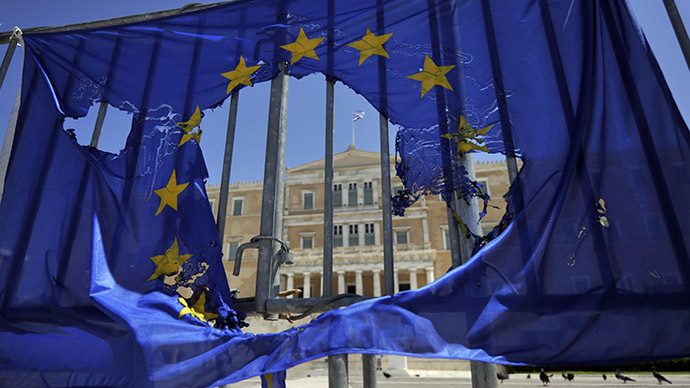‘Political manipulation’: Germany wants new Greek govt to obey forced administration

The German government insists it wants Greece to stay in the eurozone and isn’t drafting any contingency plans in case of ‘Grexit’. This shows Germany is adamant about keeping Greece under the domination of the 'troika', journalist Ernst Wolff told RT.
“The goal of the German government, the European Union and even the government in Athens itself is to keep Greece in the euro zone," German Vice Chancellor Sigmar Gabriel said in an interview on Sunday.
"There were no, and there are no, other plans to the contrary," he added, without directly refuting Der Spiegel’s report that a common belief in the German government was that the eurozone is stable enough to cope with potential Greece exit.
"That's why we can't be blackmailed and why we expect the Greece government, no matter who leads it, to abide by the agreements made with the EU," Gabriel added, echoing an earlier statement by a high-ranking member of German Chancellor Angela Merkel’s party, Michael Fuchs.
However, Berlin’s own statements and actions could be considered an act of political blackmail, journalist and author Ernst Wolff told RT.
RT:Do you think Germany is serious about ‘Grexit’, or is it just political manipulation?
Ernst Wolff: Well, to me it’s just political manipulation. I think they are just threatening the Greek people, actually they are telling the Greek people to vote for a party that will not leave the euro.
See, Greece is not a country like Germany, France or Italy at the moment – Greece has been put under forced administration of the troika that is the ECB, the EU and the IMF. And all Germany wants is to keep Greece under the domination of this organization. The Greek government can vary – the politics of the Greek government are really determined by the troika. And the German government wants this to keep going.

RT:Some economists have already called the potential Greece exit ‘Lehman Brothers squared’. So, what will happen if Greece does follow through?
EW: You see, the Greek government debt is at 175 percent right now, runs up to €330 billion. And a lot of debt nowadays is ensured in the derivative markets. So if Greece actually leaves the euro that would mean that a lot of credit default swaps would come due. And that could actually bring down the euro, and could also bring down the whole financial system, worldwide. So I don’t think that is really an option.
I think this maneuver by the German government is just a threat to the Greek working people, because they have been paying for the mistakes made by the finance industry. Look at the situation in Greece nowadays. The social systems have been devastated, the old system has been taken down, unemployment is at 26 percent, youth unemployment is at almost 60 percent. The social situation in Greece is terrible – and what Germany wants is to implement even further austerity measures. And they know that the Greek people are fed up with this, they don’t want any more of this. So the German government is telling Greek voters: “Do not vote for a party that is against our domination.”
RT:Could ditching the euro actually solve any of Greece's economic problems?
EW: I don’t think so, no, that won’t change anything. And I don’t even think that Syriza has a solution for these problems, because on the one hand they say they are going to stop with austerity measures, but on the other hand they say that they will continue with the euro. I don’t see how this can happen.
RT:If they were still to do it, do you think it could inspire other countries to follow?
EW: I think if one country would exit from the euro that would cause some kind of domino effect on other countries. But actually I do not think that it is possible, because of all the derivatives that would come due.
RT:Do you think that Germany might allow Greece to renegotiate the international bailout deal?
EW: They will have to do that, they will have to renegotiate. What they are going for now is for the Greek voters to elect the government that would be totally compliant with the demands of Germany and the EU and also of the IMF, because don’t forget that a lot of Greek debt is also in American banks.
The statements, views and opinions expressed in this column are solely those of the author and do not necessarily represent those of RT.












